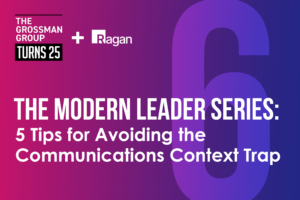The keys to handling negative feedback for leaders and managers
Tough moments can make good leaders great ones.

In every leader’s career journey, they’re bound to encounter negative feedback, whether from direct reports or a wider swath of the organization. While no one enjoys giving or receiving it, you can deploy the correct strategies and pathways to reactions to ensure any issues are addressed in a fashion that puts the work — and the employee — first.
The ability to respond to negative feedback isn’t always innate — it takes a lot of work and training to ensure that it’s done the right way. That’s why you need a framework in place that managers and leaders can refer to.
Approaching feedback head-on
It can be easy to react quickly to negative feedback or opinions. That’s just human nature. But it’s crucial to take a beat and be tactical and strategic in your responses.
Anne DeAngelis, executive vice president of employee engagement strategy at Zeno Group, said that managers need support and resources to facilitate more personalized conversations.
“Before responding broadly to the feedback, equip people managers with materials and space to ask questions,” DeAngelis said. “People managers are trusted by their team, and they need to understand the topic so they can confidently respond to questions.”
When you first encounter negative feedback, acknowledge that it exists.
“When you respond to the broader team, acknowledge the negative feedback, reiterate why the decision was made and how the decision will benefit the business and the workforce,” DeAngelis said. “This doesn’t mean it’s easy to implement, and some might not agree, but there should be solid rationale behind the decision.”
If for whatever reason you don’t share the reasoning at the outset, you need to own up to the mistake to help preserve a culture of transparency.
“Acknowledge the confusion and anxiety that it may have caused,” DeAngelis said. “Then, commit to being more transparent about future decisions and honor that commitment.”
Maintaining the focus on trust and culture
The right leaders know how to use negative feedback as an opportunity to strengthen team bonds and show leadership skills.
Troy P. Thompson, career consultant, speaker and workforce development program lead at Baruch College’s Zicklin School of Business, suggests that managers and leaders avoid dwelling on the negative responses but rather seek out the cause of the problems to remedy them.
“Upon receiving any form of critical feedback, it is important not to internalize it or allow it to undermine your sense of belonging,” Thompson said. “Instead, seek to identify the core issues being raised and request specific examples to get deeper insight into how expectations and actions may have misaligned.”
Thompson added that following up with those who have aired concerns and grievances isn’t a one-time thing, and direct responses to them will help create an open situation to provide solutions to problems. He emphasized that leaders and managers need to work to build back employee trust in the face of negative reactions.
“A communications approach that aims to reestablish employee trust is not only centered in empathy and transparency but provides employees with the opportunity to share in the way forward,” said Thompson. “Company-wide surveys can be a very effective tool for identifying core issues, which leaders should seek to improve while ensuring that employees feel heard by providing periodic updates.”
DeAngelis echoed this sentiment, underscoring the importance of feedback mechanisms in the workplace and stressing how key the proper reactions to negative feedback are for all communicators.
“People say feedback is a gift, but it’s not always easy to receive!” she said.
“Keep in mind, that the alternative is worse. People might voice their complaints behind your back or on external channels—causing damage to your team, your culture and your brand. Don’t be defensive. Act quickly and with intention and remember, there’s always room for improvement.”
Sean Devlin is an editor at Ragan Communications. In his spare time he enjoys Philly sports and hosting trivia.







